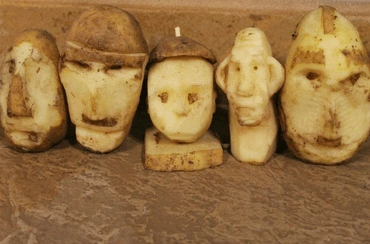1
And Jehovah called to▵ Moses, and spoke to▵ him from the Tabernacle of the congregation◦, saying,
2
Speak to▵ the sons of Israel, and say to▵ them, If▫ any man of you offer an offering to Jehovah, you shall offer your offering from the beast, from the herd, and from the flock.
3
If his offering be a burnt··offering from the herd, let him offer a perfect male; he shall offer it◦ for his own good··pleasure at▵ the entrance of the Tabernacle of the congregation◦ before Jehovah.
4
And he shall lay◦ his hand on the head of the burnt··offering; and it shall be··well··pleasing for him to make··atonement on him.
5
And he shall slaughter the young◦ of the herd before Jehovah; and the priests, the sons of Aaron, shall offer the blood, and sprinkle the blood all around on the altar that is by the entrance of the Tabernacle of the congregation◦.
6
And he shall strip··off the skin of the burnt··offering, and section it into◦ her sections.
7
And the sons of Aaron the priest shall put◦ fire upon the altar, and arrange the wood upon the fire;
8
and the sons of Aaron, the priests, shall arrange the sections, with◦ the head and the fat▵, on the wood that is on the fire which is on the altar;
9
but its inward··parts and its legs shall he bathe in water; and the priest shall burn· it all ·as··incense on the altar, for a burnt··offering, a fire··offering, a restful smell to Jehovah.
10
And if his offering be from the flock, from the sheep▵*, or from the goats, for a burnt··offering, he shall offer it, a perfect male.
11
And he shall slaughter it on the flank* of the altar northward before Jehovah; and the priests, the sons of Aaron, shall sprinkle its blood all around upon the altar.
12
And he shall section it into◦ its sections, and with◦ its head and its fat▵; and the priest shall arrange them on the wood that is on the fire which is on the altar:
13
but he shall bathe its inward··parts and its legs with water; and the priest shall offer it all, and burn· it ·as··incense on the altar; it◦ is a burnt··offering, a fire··offering, a restful smell to Jehovah.
14
And if the burnt··offering for his offering to Jehovah be of fowls, then he shall offer his offering of turtledoves, or of young◦ doves.
15
And the priest shall offer it to▵ the altar, and wring··off its head, and burn· it ·for··incense on the altar; and its blood shall be pressed··out on the wall◦ of the altar;
16
and he shall remove its crop▵ with its feathers and cast it beside the altar eastward, to▵ the place of the burnt fatness;
17
and he shall split* it with its wings, he shall not separate◦ it; and the priest shall burn· it ·for··incense on the altar, on the wood that is on the fire: it◦ is a burnt··offering, a fire··offering, a restful smell to Jehovah.







